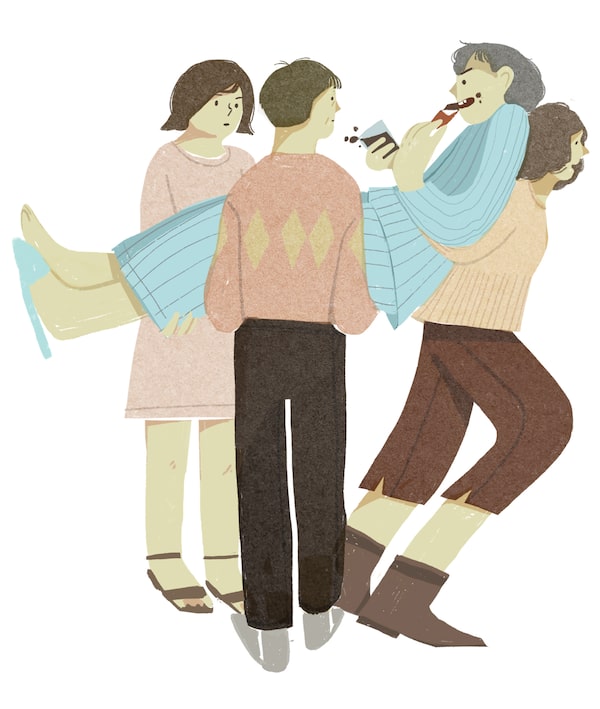
ILLUSTRATION BY KAREN SHANGGUAN
First Person is a daily personal piece submitted by readers. Have a story to tell? See our guidelines at tgam.ca/essayguide.
We arrived at the hospice carrying a haphazard tumble of my father’s belongings. We were winging it, as we do, the three of us with messily crammed bags – a pair of slippers in one hand, a portable stereo in the other.
We were shocked and giddy, not shocked because we were surprised – the call to hospice came after a short stint in hospital where it became clear that there was more cancer than lung in my father’s chest – but shocked because this was happening to us. Surely, palliative care and hospices happened to real adults, not people who shoved a bathrobe into an enviro bag at the 11th hour. We were giddy, my husband, my sister and I, because that is us, and I smiled and preened at the security camera mounted on the ceiling while we waited for someone to answer the door. There were pumpkins on either side of the front door and giant sticks arranged in giant pots, tastefully festive and illuminated by lantern light; it was like nothing more than approaching a new build in a subdivision.
The guy that let us in returned to sit at a table with a handful of other people; there was a child sleeping on the sofa in the living room. The vibe was deliberately home-away-from-home. We came to know that groups of people gathering, especially at 9 p.m., was not a good sign, but in that moment we felt very much like the newbies: the freshmen scrutinized by the graduating class.
The move to Campbell House should have felt grimmer. I wasn’t under any illusions; I understood why we were there, but I was also curious about the place where it felt vaguely like we were invited guests. I’d heard a lot around town about the amazing soup they served – and about how this death caper was going to play out. But I couldn’t picture how “after” would look or feel.
Getting here had already been a wild ride. Three years previously my fit, health-conscious stepmother was felled by cancer, six months from diagnosis to death. This was not how anyone thought things would go. My father was not fit or health conscious, he’d had a lifetime love of scotch and cigars, had diabetes and coveted Kit Kats, he rained salt on everything and had already survived an operation to remove a piece of his gut perforated by colon cancer. And yet, he was the one left standing. Everything changed, just like that.
After my stepmother’s death, my husband and I turned the bulk of our downstairs into a suite – slapped some paint on the walls, hung my father’s art, moved his furniture, popped a shower into the downstairs bathroom – and my father moved in.
Three adults was a lot, a lot of personalities, and the house dynamic changed. We had to have nurses in regularly to tend to my father’s diabetic foot ulcer; we had to have cleaners in because my dad wanted cleaners.
I became a surly teenager again. He wanted Neilson’s buttermilk, so I bought Beatrice; he would only eat with certain silverware, so I refused to eat from said silverware. There was so much bickering and banter, but we did make it work, especially when we fell into a routine of cocktail hour in dad’s digs or cigars and sherry in the backyard because that is when we would talk.
We talked about his wife’s death, about his father, about Bing Crosby, about American politics. I never did say to myself, in those moments, savour this, it won’t last forever –because sometimes it did feel like forever. But I have no regrets now, partly because of those moments. Even the cat liked cocktail hour and scratched on his door, every day at 5, for ages after he was gone.
Then hospice happened and we ended up doing it our way, my three siblings, my daughter, my husband and I (not to mention boyfriends and cousins and friends), because we didn’t know how to do it any other way. We would roll up en masse, some combination of my father’s “gang” as he liked to refer to us, every day twice a day for 41 days. This routine was so hamster wheel that we had to amuse ourselves and, with Dad, watched crappy made-for-TV Christmas movies, rode the electric recliner – hours of fun! – played with filters on our phones and enforced a bedside cocktail hour.
My father’s attitude helped: He was insanely upbeat, genuinely accepting that he was actively dying. He came to look at his time at hospice as if he were on vacation at a spa and took full advantage of the tireless staff and volunteers who talked with him, listened to him and sat with him, and brought us all countless egg-salad sandwiches and, yes, amazing soup.
My father would hold court from his bed – much like real life – covered in crumbs and candy-droppings, downing Skor bars and Mars bars and Pringles and tin after tin after tin of root beer. He would pose for Snapchat photos and filters and randomly break into song, much like real life. He and I never did stop our bickering banter; I’d still talk back, he’d still shake a fist and neither of us would back down.
Now it is “after” and though there is no Dad, there always was Dad. I really want to tell him stuff about our lives. I want to tell him that we eventually left the hospice carrying a portable stereo in one hand and a spindly Christmas cactus in the other, through the doors past the giant sticks and cedar boughs arranged in giant pots, tastefully festive and still illuminated by lantern light, and it felt like we had graduated.
Alexandra Robbinson lives in Collingwood, Ont.